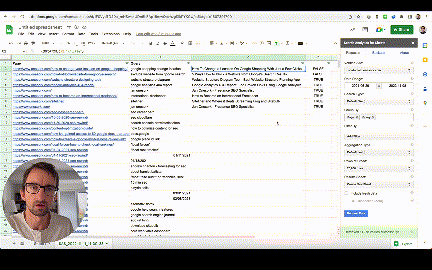Today I bring you a video with a tip aimed at SEO beginners or simply those who want to find low-hanging fruit opportunities for improvement on an existing website.
I'll show you how to export keywords from Google Search Console and compare them to elements on your site, such as titles and more.
This way, you can easily check if your content matches the popular keywords your visitors use in search. And find opportunities where you can improve your headlines or page titles.

Watch the video now and let me know if I should make more of these videos 😊
You'll find the usual recap of everything important in SEO below. ⬇️ ⬇️ ⬇️
Thank you and have a great weekend!
Jan
Google's October Spam Update
On October 19, Google launched yet another ranking update focused on fighting spam in SERPs. The rollout was complete as of October 21 and affected all languages.
So far, it seems that this update was targeting spammy sites that you probably don't want to see in SERPs anyway - sites with scraped content, duplicate, low-value content, and adult sites.
Today we released the October 2022 spam update. Find out more about spam updates at https://t.co/XthD5GF06M . We'll update our ranking release history page when the rollout is complete: https://t.co/sQ5COfvo3J
— Google Search Central (@googlesearchc) October 19, 2022
New Google Search Essentials
Google refreshed its Webmaster Guidelines and launched it under a new name - Google Search Essentials. With this new name come many small improvements as more practical examples.
Google Webmaster Guidelines have always been the best source of basic SEO information, so keep this in your bookmarks.

Site Names in Google's Search Results
Google introduced Site Names in mobile search results. Site names identify the website that is associated with each search result.

You can use structured data to indicate your website's preferred site name.
Site names are currently available for mobile Google Search results in English, French, Japanese, and German, and will be rolling out to additional languages over the next few months.

Details on Google Search Console data and limits
Google published a new summary of key information you need to know when working with GSC data.
This summary provides more details about data filtering and export limit. It also explains anonymized queries again - which is helpful since it is often a great source of confusion for new GSC users.

KeywordInsights.AI Updates
KeywordInsights.AI, the up-and-coming set of tools for keyword research, pushed live a lot of updates last month.
A new SERP Similarity tool shows how two (or 3) keywords are similar - to help you better decide if you need to use one or two pages for targeting. This tool is free to use.
There are also plenty of other refinements and design improvements.
Project Butterfly @keywordinsights update is coming in hot. ♨️
— Suganthan Mohanadasan (@Suganthanmn) October 3, 2022
So what's new?
+A fresh new design
+New keyword clustering algorithm
+Easier to upload keywords
+Content briefs – New features
+SERP Similarity
+Public API
+Credits as a universal currency
+Keyword Discovery update pic.twitter.com/gHQweUeHwe
I highly recommend including KeywordInsights in your toolbox if you haven't already.
New Image Structured Data
Google added new documentation for image metadata in Google Images.
Previously, you had to use IPTC metadata (included in the image file itself) to show additional information, such as authorship or license in Google Images.
Now you can do the same using structured data.

Don't Change Image URLs
In Episode 48 of Search Off the Record, they discussed many topics related to image search.
One interesting point that John Mueller mentioned was about image URLs. Don't change image URLs unless you have to. Google crawls this type of content (which generally doesn't change very often) with little frequency. It will take a long time for the changes to take effect - heaven forbid if you change the URLs of all the images at once.










Member discussion